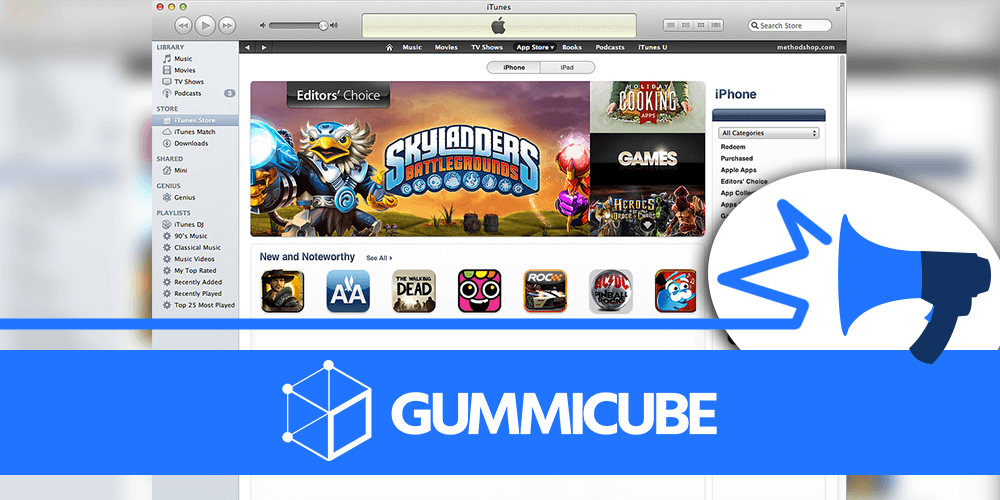Apple’s App Store Turns 10 – How Has it Changed?
July 20th, 2018


by Anh Nguyen
COO & Co-Founder at Gummicube, Inc
Ten years ago, Apple launched its App Store and reshaped the way we use mobile devices. Suffice to say, the app ecosystem has changed significantly in that time, and the app economy is on track to be worth over 6 billion by 2021. With ten years behind us and an infinite future ahead, it’s time to look back and see how the world of apps has changed.
How it Started
When the Apple App Store first launched, it had a mere 500 apps available. Several apps that do still exist today were just a shadow of what they would one day become, such as Facebook’s minimalist newsfeed. Other apps that are commonplace today, such as Twitter - which didn’t release its app until 2010 - didn’t even exist then. Many of the websites and mobile services that users are so used to having readily available had yet to create apps. Many of the first apps available were simply experiments of the iPhone’s functionality or an avenue for brief amusement. Take iBeer and Lightsaber Unleashed: these were ranked in the App Store’s Top 10 while only filling the screen with beer or creating lightsaber sound effects. In fact, there was a novelty app called “I Am Rich,” priced at $999.99, which consisted solely of a glowing red button that boasted about how rich the user is.  Suffice to say, the app environment was a very different beast in its early days.
Suffice to say, the app environment was a very different beast in its early days.
How it Has Grown
Today the App Store hosts over 2 million apps, a significant increase from its original 500. The saying “There’s an app for that” is truer than ever. We use apps to check on our homes during vacation, to order food, to buy movie tickets, connect remotely with friends and colleagues all over the world, and of course, for games. Previously top-rated apps have shifted dramatically as well. Novelty apps are a thing of the past, and new tools and social networks have risen. Man apps relied on existing services and were simply a convenient mobile extension. Today, entire businesses, games and services are built with the App Store at their core. Few would have predicted that we’d be using apps to ask for rides from strangers, but now we have ride-sharing apps like Uber. Meanwhile, apps like Koi Pond no longer exist as the app economy has moved on. Notably, Facebook has managed to remain relevant and constantly update throughout all these years, consistently maintaining a spot in the top 10 free apps. That is due in large part to its updating and adapting to the changing app environment. Other apps, including mobile games like Angry Birds, have managed to remain popular and relevant by becoming a brand and releasing new versions and spinoffs while improving.
How Times Have Changed
Technology has advanced since the early days of the App Store, and apps have grown with it. The Internet of Things (IoT) allows us to be more connected to everything, Augmented Reality (AR) has become more accessible and businesses of all sizes are learning the benefits of having an app.  Furthermore, we’re seeing shifts in the demographics and markets. Mobile games dominate the app market at 17% of all existing apps, followed by business, utilities and entertainment. Free apps, which once consisted of only 25% of the apps on the store, are now widely available, with 89% of existing apps available for free. Most importantly, apps have become a part of our lives. Users constantly wanting something to make their lives easier drives growth and demand, causing the number of apps readily available to the market to increase. Now, we have popular businesses at our finger tips, which has led to those not utilizing apps to be at a severe disadvantage. So much has grown and changed in the ten years since the Apple App Store first launched, from the kinds of apps used to the technology behind them. One thing has remained constant throughout all the change, though: an app is only useful if users download it. For that, App Store Optimization is and will always be key to an app’s success. With ASO, you can keep up with the changes and developments in the App Store and app ecosystem to remain relevant no matter how times change.
Furthermore, we’re seeing shifts in the demographics and markets. Mobile games dominate the app market at 17% of all existing apps, followed by business, utilities and entertainment. Free apps, which once consisted of only 25% of the apps on the store, are now widely available, with 89% of existing apps available for free. Most importantly, apps have become a part of our lives. Users constantly wanting something to make their lives easier drives growth and demand, causing the number of apps readily available to the market to increase. Now, we have popular businesses at our finger tips, which has led to those not utilizing apps to be at a severe disadvantage. So much has grown and changed in the ten years since the Apple App Store first launched, from the kinds of apps used to the technology behind them. One thing has remained constant throughout all the change, though: an app is only useful if users download it. For that, App Store Optimization is and will always be key to an app’s success. With ASO, you can keep up with the changes and developments in the App Store and app ecosystem to remain relevant no matter how times change.
Similar Articles

Posted on May 23rd, 2024
Keyword targeting has arrived to Google's Custom Store Listings, opening up opportunities for more granular audience targeting and even more personalized experiences. Learn how you can use them to your advantage!

Posted on January 25th, 2024
Have you received a WhatsApp message, LinkedIn message, or a message from another messaging app offering a remote work opportunity by an individual claiming to be affiliated with Gummicube?

Posted on January 9th, 2023
From Apple’s Fitness+ update, Google providing insight into real users versus bots, and Play Store Changelogs potentially being phased out, this ASO Weekly analyzes the different developments you should be aware of as 2023 kicks off.




 Suffice to say, the app environment was a very different beast in its early days.
Suffice to say, the app environment was a very different beast in its early days. Furthermore, we’re seeing shifts in the demographics and markets. Mobile games dominate the app market at
Furthermore, we’re seeing shifts in the demographics and markets. Mobile games dominate the app market at 
